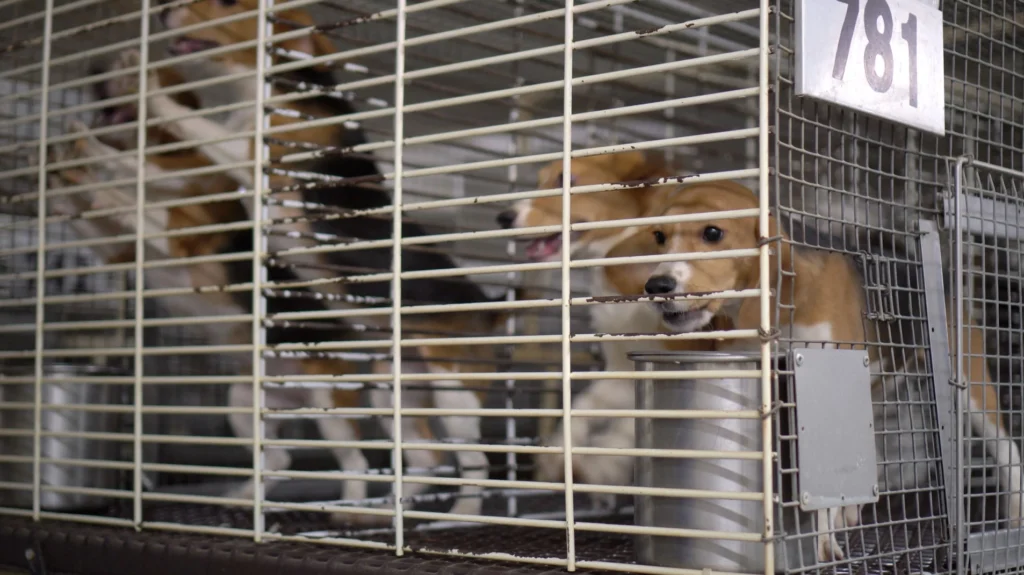At a time when FDA and NIH are seeking to phase out testing on beagles and other animals, the Ridglan Farm operation is archaic, supplying beagles to laboratories
BLUE MOUNDS, Wis. – Animal Wellness Action and the Center for a Humane Economy today commended the Wisconsin State Veterinary Examining Board for unanimously voting to suspend the license of Dr. Richard Van Domelen, the lead veterinarian at Ridglan Farms, one of the nation’s last and largest commercial beagle breeding facilities supplying animals for testing and research.

Ridglan Farms confines an estimated 3,000 to 4,000 beagles at its Blue Mounds facility, selling dogs to pharmaceutical companies, contract research organizations, and laboratories across the U.S. and Canada, typically for invasive and painful tests. The company also conducts its own research on dogs.
Earlier this year, the Board permitted Van Domelen to continue practicing under limited conditions. Yesterday, however, the Board unanimously voted to suspend his license after evidence emerged of egregious violations, including delegating hundreds of “cherry eye” surgeries to unlicensed staff.
In a shocking defense before the Board, Van Domelen compared his violations to a child struggling with math homework:
“When helping your child with math homework, do you simply tell your child that the answer is wrong, do it again, repetitively? Or do you explain what the mistake was and how he or she should do it correctly? That’s all I’m asking for today,” he said.
“Ridglan Farms is a horror show for beagles. We stand with the whistleblowers, former employees, and dog advocates who have risked their safety and livelihoods to expose the ugly backstory of this facility,” said Wayne Pacelle, president of Animal Wellness Action and the Center for a Humane Economy. “This suspension marks an important first step in holding Ridglan accountable. This facility has no redeeming value in a nation moving away from beagle breeding and it should be shuttered.”
“Directing unlicensed staff to perform improper, painful surgeries without anesthesia is a flagrant violation of veterinary ethics and animal welfare,” added Rebekah Robinson, president of Dane4Dogs. “We urge regulators to continue strong enforcement until the cruelty at Ridglan is stopped for good.”
“We have formally asked the National Institutes of Health to stop funding experiments that use beagles procured from Ridglan,” said Tamara Drake, director of research and regulatory policy for the Center for a Humane Economy. “Taxpayer dollars should not underwrite cruelty and corner-cutting at facilities that repeatedly break the law.”
In addition to the veterinary board action, Ridglan is under criminal investigation. A Wisconsin judge recently appointed a special prosecutor to investigate the company after finding probable cause that Ridglan committed felony animal cruelty by causing dogs “unnecessary and excessive pain or suffering.” The court also found probable cause of multiple misdemeanor offenses, including failure to provide safe enclosures, adequate space, sanitation, and ventilation.
According to the Wisconsin Department of Agriculture, Trade and Consumer Protection (DATCP), Ridglan had until 4:30 p.m. Friday to agree to settle a $55,000 civil forfeiture tied to hundreds of alleged violations of state animal welfare laws. On Saturday, DATCP confirmed that Ridglan declined the stipulation, and the case is now being referred to the Dane County District Attorney’s Office. In early September, DATCP cited Ridglan for over 300 violations, including failure to provide proper veterinary care, unsafe enclosures, and improper documentation related to the treatment of dogs used for medical research.
Ridglan Farms has long been a corporate player in our nation’s broken system of animal testing as a central feature of drug screening for safety and efficacy purposes. In April, the FDA issued its “Roadmap to Reducing Animal Testing in Preclinical Safety Studies,” which sets a 3-to-5-year goal to make animal studies the exception rather than the norm for preclinical safety and toxicity testing. The FDA announcement follows years of advocacy and legislative action by the Center for a Humane Economy, Animal Wellness Action, and their coalition partners who successfully fought to enact the FDA Modernization Act 2.0 in 2022, eliminating a Depression-era mandate that required animal testing of all new drug candidates. The groups are now spearheading the FDA Modernization Act 3.0 to urge the practical application of non-animal test methods in drug screening to lower drug prices, speed delivery of drugs to patients, expand the number of drugs developed, and increase the safety and improve performance of drugs.

